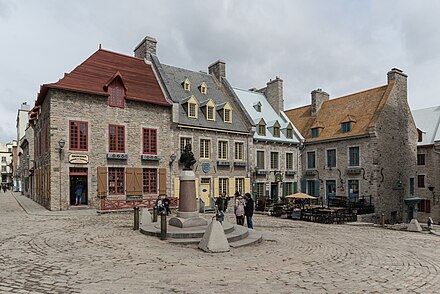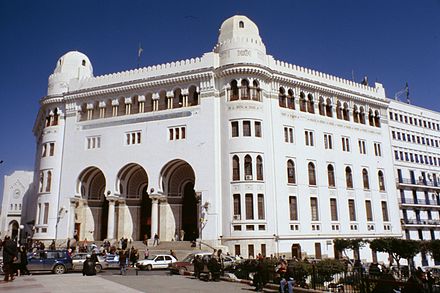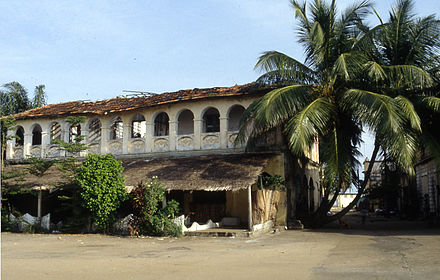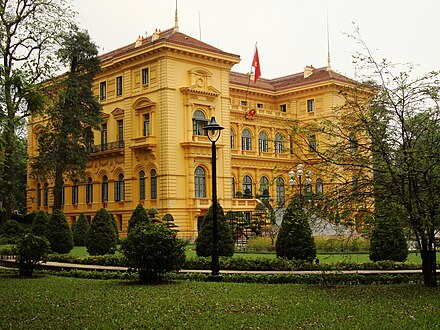French Colonial Empire
French Colonial Empire
France has possessed multiple empires over its existence, but the two most recent, the First French Colonial Empire (Premier empire colonial français) of the Early Modern Era and the Second French Colonial Empire (Second empire colonial français) of the Modern Era, are included here.
Understand
The word empire traditionally describes a state ruled by an emperor (with claims to succeed the Roman Empire); a title possessed by Napoleon Bonaparte and Napoleon III. In a more general sense, the French Empire described France's colonies and dominions overseas.
First Empire
See also: Kingdom of France
France's colonial history can be divided into two periods. The first French colonial empire consisted mainly of possessions in the Americas, both on the North American continent and in the Caribbean archipelago. France acquired them during the conquest of the "New World" by European powers in the 16th and 17th centuries. Many major North American cities were founded by the French, including not only Montreal, Quebec City and New Orleans, but also Detroit, St. Louis and Chicago. In the Seven Years' War of 1756–1763 (known as the French and Indian War in North America), France lost much of its North American territories to Britain. What once was "New France" became known as Canada. The British expelled most of the French-speaking residents of Acadia — France's colony in what are now Canada's Maritime Provinces and parts of Maine — and many went to Louisiana where Acadien mutated into Cajun.
Louisiana – consisting not just of today's state of the same name, but a vast territory in the South, Midwest and Great Plains of what now are the United States — was split along the Mississippi. The eastern half became the British "Indian Reserve", the western part was ceded to the Spanish Empire. France re-acquired Spanish Louisiana during the Napoleonic Wars in 1802, only to sell it to the United States for fifteen million dollars a year later (Louisiana Purchase, or vente de la Louisiane from the French point-of-view). Inspired by the French Revolution, the colony of Haiti declared itself an independent republic in 1804. After that France only kept a few tiny possessions in India and remote islands. Napoleon's Empire was eventually defeated in 1815, and replaced by the Bourbon Monarchy which made concessions to other European great powers.
Second Empire
.png/440px-Empire_colonial_fran%C3%A7ais_(1920).png) The expansion of France's second colonial empire began with the conquest of Algiers in 1830. The 1830 July Revolt overthrew the dynasty and led to the July Monarchy up to 1848, followed by the Second Republic (from 1848), the Second Empire (from 1852) and Third Republic (from 1870). The Second Empire, led by Napoleon III, was particularly expansionist, especially in Africa and Southeast Asia. Republican France however, was not less keen on its overseas possessions than the monarchy had been. France was highly successful in the European powers' "Scramble for Africa", multiplying its territories on the continent between 1875 and 1905. This was also a way to compensate the bitter defeat suffered in the Franco-German War of 1870/71. Paradoxically, some republican politicians that were very progressive on domestic affairs, were the most hardline when it came to the treatment of France's non-European subjects. France also won several wars against China, gaining for itself several concessions in various Chinese cities such as Shanghai, Tianjin and Hankou, as well as a colony in Zhanjiang near their Southeast Asian colonies.
The expansion of France's second colonial empire began with the conquest of Algiers in 1830. The 1830 July Revolt overthrew the dynasty and led to the July Monarchy up to 1848, followed by the Second Republic (from 1848), the Second Empire (from 1852) and Third Republic (from 1870). The Second Empire, led by Napoleon III, was particularly expansionist, especially in Africa and Southeast Asia. Republican France however, was not less keen on its overseas possessions than the monarchy had been. France was highly successful in the European powers' "Scramble for Africa", multiplying its territories on the continent between 1875 and 1905. This was also a way to compensate the bitter defeat suffered in the Franco-German War of 1870/71. Paradoxically, some republican politicians that were very progressive on domestic affairs, were the most hardline when it came to the treatment of France's non-European subjects. France also won several wars against China, gaining for itself several concessions in various Chinese cities such as Shanghai, Tianjin and Hankou, as well as a colony in Zhanjiang near their Southeast Asian colonies.
The French Colonial Empire would be further expanded following the Allied victory in World War I, when it gained colonies from the defeated Central Powers. Among these territories were what is today Cameroon and Togo, which were German colonies, as well as what is today Syria and Lebanon, which were part of the Ottoman Empire. Moreover, the borders of Metropolitan France were expanded as it gained Alsace and Lorraine from Germany. At its apex around 1920–1930, the French colonial empire controlled much of Africa and parts of the Middle East and Asia with a total area of roughly 11,500,000 km².
During World War II, the Free French forces under General Charles de Gaulle took control over the colonies from pro-fascist Vichy France one by one, using them as bases for the liberation of the French mainland. By the 1946 constitution (Fourth Republic), the colonial empire was renamed to "French Union", giving nominal autonomy to the colonies that were now euphemised as "associated states". The colonial empire dissolved during the following decades, after very bloody wars against the independence movements in Indochina (1946–1954) and Algeria (1954–1962). Unlike these two, most colonies in Sub-Saharan Africa were granted independence without bloodshed around 1960 (the "Year of Africa"), but France has continued to exert considerable influence in its former colonies, though in the 21st century, this influence is increasingly being challenged by that of a resurgent China. By the 21st century, the French colonial empire had been reduced to small territories, mostly offshore islands, with many now an integral part of France. France's large populations of African, Arabic, and Southeast Asian origins are a consequence of its erstwhile colonial empire.
Destinations
France

- Palace of Versailles — principal royal residence of France from 1682 to 1789
- Musée du Louvre — some parts of the collection were brought here from the former colonies.
- Place de la Concorde — Home to colonial-era architecture; the Luxor Obelisk was gifted by the Egyptian government to France in 1833; the Maritime Fountain completed in 1840 symbolises France's overseas interests.
- Palais Garnier — one of the most famous examples of "Second Empire" architecture.
- Eiffel Tower — built on the occasion of the 1889 Exposition Universelle during the heyday of French colonialism.
- Musée du quai Branly — museum of indigenous art and cultures of Africa, Asia, Oceania, and the Americas, including ethnographic collections from the former French colonies.
- Musée de l'Histoire de l'immigration — many immigrants came to France from its former colonies; the museum is housed in the Palais de la Porte Dorée, built for the 1931 Paris Colonial Exposition.
- Palais de Chaillot — built for the 1937 Exposition Internationale in place of the former Palais du Trocadéro, to display the modernity and greatness of France during the interwar period.
- Musée Guimet — collection of Asian art, especially from formerly French Indochina.
- Museum of European and Mediterranean Civilisations (MUCEM), Marseille — parts of the collection were inherited from the colonial-era Musée d'Ethnographie du Trocadéro and its successor Musée de l'Homme.
Former French colonies
First colonial empire (16th century to 1803)
See also: New France
 ;North America
;North America
- "New France" possessions in today's Canada (1534–1763) – Acadia, Newfoundland, Quebec, Ontario, southern Manitoba; Quebec City, the former capital of New France and today the capital of Quebec province is particularly known for its large array of well-preserved French colonial buildings, and French is still the dominant language of the province in contrast to the rest of otherwise majority-English-speaking Canada.
- French Louisiana (1682–1763) – included much of what now is the US South, Midwest and Great Plains; the French influence is most noticeable in the Acadiana region of the present-day state of Louisiana and in New Orleans, once the colonial capital of French Louisiana, both of which continue to stand out as bastions of Roman Catholicism in an otherwise strongly Evangelical Protestant South.
;Caribbean
- Dominica (1625–1763)
- Grenada (1650–1762)
- Haiti (1627–1804)
- Saint Croix (1650–1733)
- Saint Kitts (1628–1690)
- Saint Lucia (1650–1723, 1756–1778, 1784–1803)
;South America
- São Luís (1612-1615) - capital of the tentative colony of France Équinoxiale.
- Rio de Janeiro (1555-1567) - capital of the tentative colony of France Antarctique, which had control over the coast from Rio de Janeiro to Cabo Frio, founded on Villegaignon Island (named after French admiral Nicolas Durand de Villegaignon, the governor), where the Brazilian Naval School stands today.
- Falkland Islands - in French Îles Malouines, after the port of Saint-Malo, from whence French explorer Louis-Antoine de Bougainville had departed with his ships and colonists in 1764. The first to set foot here, he named them, and founded their first settlement Port Louis. In 1766, France surrendered to Spain its claim on the Islas Malvinas.
Second colonial empire (1830 to 1960s)
 ;Northern Africa and Middle East
;Northern Africa and Middle East
- Algeria (1832–1962)
- Tunisia (1881–1956)
- Morocco (1912–1956) — not including Mediterranean Morocco and the Western Sahara that were Spanish
- Syria (1920–1946) — which, until 1938, included Turkey's Hatay Province, where the former French presence is still architecturally visible in parts of the regional capital, Antioch
- Lebanon (1920–1946)
 ;Sub-Saharan Africa
;Sub-Saharan Africa
-
French West Africa
- Senegal (1677–1960)
- Ivory Coast, or Côte d'Ivoire (1843–1960)
- French Sudan, now Mali (1883–1960)
- Dahomey, now Benin (1883–1960)
- Niger (1890–1960)
- Guinea (1891–1958)
- Upper Volta, now Burkina Faso (1896–1960)
- Mauritania (1902–1960)
- Togo (1918–1960, formerly German colony)
-
French Equatorial Africa
- Gabon (1839–1960)
- French Congo, now Republic of the Congo (1875–1960)
- Chad (1900–1960)
- Oubangui-Chari, now Central African Republic (1905–1960)
- Cameroon (1918–1960, formerly German colony) — not including the Northwestern strip bordering Nigeria, that was British
-
Mauritius (1715–1810)
-
Seychelles (1756–1810)
-
French Somalia, now Djibouti (1862–1977)
-
Comoros (1866–1975)
-
Madagascar (1896–1960)
 ;Asia
;Asia
- Indochina
- China
- Kouang-Tchéou-Wan (1898–1945) in Western Guangdong, including Zhanjiang and the islands of Donghai and Naozhou
- French Concession in Shanghai
- French Concession in Tianjin
- Shamian Island, Guangzhou
- French Concession in Hankou
- French India (1721–1954)
- Chandannagar (Chandernagore, Chandernagor). — A city in West Bengal.
- Karaikal. — A small enclave within Tamil Nadu.
- Mahé. — An enclave within the Malabar region of Kerala.
- Pondicherry (Pondichéry, Puducherry, Pondy). — Former capital of French India.
- Yanam (Yanaon). — An enclave within the Northern Coast of Andhra Pradesh.
;Oceania
- Vanuatu (1887–1980, condominium shared with Britain after 1906)
Current overseas territories
See also: France#Overseas France
;North and Central America
;Caribbean
;South America
;Indian Ocean
;Oceania
See also
- Atlantic slave trade
- Age of Discovery
- Colonial India
- Early United States history – large parts of the US were purchased from France
- Military history: Napoleonic Wars, World War I, World War II in Europe
- Indochina Wars – led to the dissolution of the French colonial empire